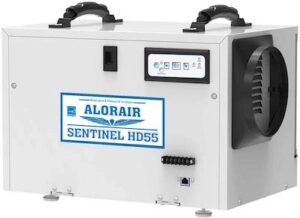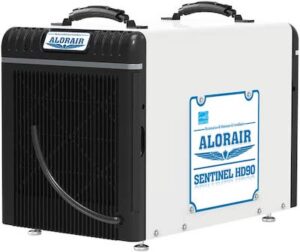Using a Dehumidifier in a Crawl Space
Most likely, you don’t spend an excessive amount of time in your crawl space. So you probably don’t know how much moisture is beneath your home. But this could be bad for your home and cause significant structural problems. There are many issues with a damp crawl space, but what can you do to treat it? Can you use a dehumidifier in your crawl space? What are the benefits of a dehumidifier? What issues can be caused by excess moisture in your crawl space? We’re here to answer your questions so you can take care of your come to the best of your ability!
So, do you need a dehumidifier in your crawl space? Yes, One of the best ways to prevent moisture from being in your crawl space is a crawl space dehumidifier. Dehumidifiers reduce the humidity by pulling water from the air. The air is then filtered and cooled, which turns into condensation. This condensation is collected and stored in a tank that you often empty or drains through a water line. Using a dehumidifier can be one of the best solutions in fighting moisture that could lead to mold under your home or wood rot!
Adverse Effects of Moisture Under Your Home
Humidity and dampness under your home can cause significant structural problems. When you combine moisture with the dust collected in a crawl space, that can create the perfect environment for mold and mildew to cultivate. This can be especially dangerous for those of your family that suffer from respiratory or immune issues.
Health Risks
Moisture can pose health risks to you and your family. If you have allergies, asthma, any respiratory condition, or a compromised immune system, you can be at greater risk for mold to pose a significant health risk. Mold can even contribute to the development of asthma in children. Fortunately, dehumidifiers help with mold!
Moisture doesn’t just encourage mold and mildew to thrive. It can also be an invitation for pests, including dust mites and termites. These pests can be damaging to the structural integrity of your home.
 Uncomfortable Home
Uncomfortable Home
As well as your health, moisture can also affect your comfort level in your home. When you live in a humid environment, you feel sticky, sweaty, and generally uncomfortable. Your home and belongings aren’t meant to hold a significant amount of moisture. Materials like wood, fabrics, and electrics can become damaged from exposure to water. This can contribute to the decay of your home’s structural flooring system. Your floor system is often mainly composed of wood, from the floor joists to the main beams. If they start to deteriorate, your floor may begin to slope or sag.
Higher Utility Bills
Moisture can also cause you to pay more for your utility bills. Your HVAC system may be forced to compensate for the extra water and can wear out sooner than intended. Your HVAC system is not necessarily supposed to be used to negate moisture. Using it to fight moisture can reduce your HVAC system’s efficiency and cost you more money in the long run.
Sources of Moisture in Your Crawl Space
There are various sources of moisture for water being in your crawl space. Water in your crawl space may be caused by a plumbing leak, foundation cracks, water seeping from the surrounding soil, usually from heavy rain, poor drainage, or condensation. Water that collects around your foundation can cause hydrostatic pressure, putting stress on your foundation and creating damage.
Moisture may also condense on cold surfaces like your equipment, including pipes, ductwork, and HVAC systems can create condensation that causes moisture in your crawl space. Water can also directly collect in your crawl space if you don’t have a moisture barrier in place.
To fix a water issue in your crawl space, you should first understand where the water is coming from. Surface water is typically from overflowing gutters, roof drainage, grading issues, or leaky basement windows or window wells. Groundwater is when the ground becomes oversaturated after heavy rain or snow. This water eventually finds its way in after pushing against the walls of the foundation. A plumbing lead or a burst pipe can also cause water to collect in your crawl space. If a burst pipe is creating moisture in your crawl space, you may need to contact your local insurance agent.
Signs of Moisture in Your Crawl Space
You may not know you have a moisture problem until it’s progressed too far. Here are some signs to watch out for:
- Moisture on the Inside of Your Windows
- Strong Musty Odor
- “Sticky” or Clammy Feeling, Even With the A/C
- Swelling of Doors and Windows
- Sagging, Sloping, or Creaking Floors
- Crack in the Drywall
- Gaps Between the Floor and Baseboard
If you notice any of these signs, you should invest in a whole-house dehumidifier or a moisture barrier. You will also need to consider installing a dehumidifier or moisture barrier if you look into your crawl space and notice any of these potential problems:
- Pest Damage
- Wood Rot
- Rust
- Sagging Insulation
The quicker you can address any of these issues, the sooner you can prevent extensive repairs. If you believe that you’re having moisture issues in your crawl space, you may want your foundation evaluated.
Why Choose a Dehumidifier
There are a few reasons why you should consider a dehumidifier for your crawl space. First, dehumidifiers will respond to the conditions in your crawl space. When the moisture increases, it will detect the change and run accordingly. It can even run when your HVAC system isn’t running. When you choose to use a dehumidifier, it won’t swap “old” air for “new” air from your HVAC system. It solely removes moisture from the air. Because you won’t be altering your HVAC, you won’t risk an airflow imbalance.
If you decide that a dehumidifier is the best option for you and your home, you should buy one to dedicate solely to your crawl space. This will be the most effective, low-risk method to keep your crawl space dry. A whole-home dehumidifier isn’t the same as a dehumidifier that you can buy at a local store. Instead, it’s a high-quality machine that will last you a long time. You shouldn’t have to worry about it breaking down in just a few years.
Highest Rated Basement/Crawl Space Dehumidifier on Amazon:
AlorAir Basement/Crawl Space Dehumidifiers 198 Pint
Benefits of Having a Dehumidifier
There are some places in the world where humidity just can’t be escaped, significantly depending on the climate you live in. But that doesn’t mean that your home can’t escape the moisture. You just need to invest in a high-quality dehumidifier system for your home.
There are a variety of benefits to having a dehumidifier in your crawl space, including:
- Protecting Your Health: When your home’s air quality is improved using a dehumidifier in your crawl space, you help protect your health. With a ton of moisture in the crawl space, it becomes the perfect environment for mold and dust mites. Using a dehumidifier can reduce and prevent some health issues like headaches, eye irritation, and respiratory issues.
- Protection Against Pests: Moisture can sometimes encourage pests to live in your crawl spaces. Certain pests love dark, damp places to live. These pests can cause more damage to your home than natural disasters. When you reduce the amount of moisture, you can prevent pest infestations.
- Structural Integrity: When there is a lot of moisture in your home, it affects your home’s structural integrity. Wood rot occurs when you have a lot of water and the possibility of the wood not holding the weight of your home increases. A dehumidifier can help to protect your home and increase its structural integrity.
- Home Comfort: High moisture levels can make you and your family feel sticky and hot. When you reduce the temperature of your air conditioning, you end up feeling clammy and cold. However, if you use a dehumidifier, you can control the humidity level in your home. This will make you feel more comfortable at a higher temperature, which can save you money.
- Efficient Energy Use: If you use your air conditioning to combat humidity, you’ll often run up a larger energy bill. Using an energy-efficient dehumidifier can help you to save money in the long run.
What Size Dehumidifier Should I Get?
When you look for a whole-home dehumidifier, they’ll be sold by capacity. This refers to the amount of moisture the dehumidifier can remove in a single day. To make an educated purchase, you’ll need to know your home’s condition and square footage. The condition is the moisture level of your crawl space. This could be subjective, depending on which manufacturer chart you read. You can use a hygrometer device to measure the humidity of the air to get an accurate reading.
Consider investing in a model that can handle a more significant amount of space than your home if you can afford it. If you invest in a unit that can only handle the amount of space in your home, it may run at its maximum the entire time it runs. When you do this, you’ll be able to save money and use less energy. When the dehumidifier runs at a lower setting, it’ll be quieter than running on the maximum setting. You’ll also be able to reduce the wear and tear on the dehumidifier, which will enable it to last longer.
Thank you for reading! You can find more home tips from experts here.

